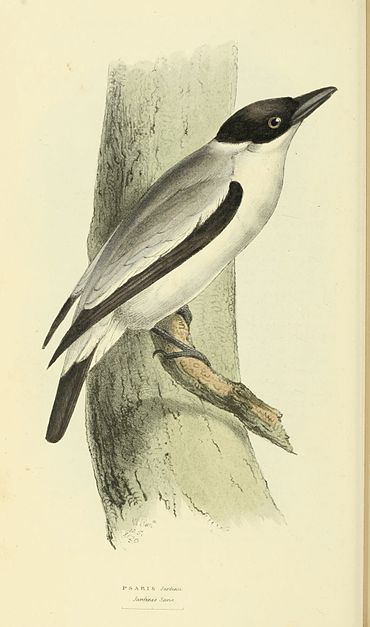Zoological Illustrations Series II/Plate 35
PSARIS Jardinii
Jardine's Saris.
PSARIS Jardinii.
Jardine's Saris.
Family Todidæ.—Nob. Sub-family Psariana.—Nob.
Generic Character.
Bill thick, strong, more or less depressed, culmen not elevated, both mandibles notched, the upper convex: nostrils round, nearly naked: rictus smooth; mouth very wide. Wings long, pointed, the second and third quill longest. Tail short, even.
Specific Character.
Cinereous white; head, tail, and outer half of the wings, black: first and fifth quill equal: spurious quill none; orbits plumed.
In Mus. Nost.
In a small collection of birds, from the interior of the vast Empire of Brazil, we met with this new and highly interesting species. Its resemblance to the well known Psaris Cayanus is so close, that even Ornithologists would not at first suspect the difference; and this may possibly account for its having been overlooked. The size and colour of the two birds, in fact, are perfectly alike: but in this, the bill is much more depressed; the orbits, instead of being naked, are covered with feathers: and the spurious intermediate quill is entirely wanting. Our bird thus presents not only the characters of a species, but a modification of form, leading to the genus Pachyrhynchus of Spix.
Our friend Sir William Jardine, Bart., who has long felt, with us, a peculiar interest in this group, will accept our dedication of this species to him, as a proof of the estimation in which we hold his studies.
The publication of Psaris Cuvierii in the early series of our work, was the first addition made to this group after its publication in the Regnè Animal. The generic name of Psaris soon after became familiar to British Ornithologists, by being universally adopted. Recently, however, the Editor of the Zoological Journal has expressed his opinion that this name, on the score of priority, should give place to another. The question would be of little moment did it merely concern this group; but involving, as it does, the entire nomenclature of two systems, it becomes a matter of some importance to ascertain their respective claims. The period of typographic publication, as connected with the only process by which knowledge can be universally communicated, is the only criterion, in our opinion, by which such claims should be decided. Dates, if truly affixed, speak for themselves. But to attain this advantage, no surreptitious or disreputable practices can be allowed. A plausible claim may indeed be made by any author, who hastily puts together an essay or pamphlet, for the sole purpose of anticipating the patient labours of another: but such artifices, when discovered, are sure to be discountenanced by honourable minds. To illustrate our meaning better, we will state a case.
Let us suppose, then, a learned Naturalist, in charge of a public museum, is engaged in a general classification of the animal kingdom: that to the type of each group, as progressively defined, he affixes a label, with the proposed name, and returns it again to the public rooms. Let us further suppose that an Ornithologist, wishing to make a new system, but without any materials for so doing, goes to this museum, selects, as they are successively named, these identical types for his examination, well knowing by whom, and for what purpose they are so named. He then goes home, and publishes, with all expedition, an ill-digested pamphlet, wherein every group appears under a name, totally different from that by which he became acquainted with it.
It is not for us to make the application. But that such practices have been resorted to, is well known among the highest scientific authorities in Paris. It is not so much in justice to a distinguished individual, as our respect for the broad principles of truth and honour, that we have said thus much. These are grave charges, but they are not lightly brought forward. Resting, as they do, on testimony the most unquestionable, we should deem it almost insulting to our countrymen could we suppose they will henceforward, by adopting these names, countenance a claim built on such a fraudulent basis.
Our views of the natural situation of this group, must be reserved for the next number.

